Rico Nasty refuses to touch her French onion soup. We’ve met up at The Smith in New York City and while her boyfriend Malik and publicist Ariana have tucked into their meals with gusto, Rico seems pretty disappointed with the quality of her soup. So, she begins asking about the contents of the table’s other occupants’ plates. “What’s that?” she repeats for each of our meals, her curiosity only extended as far as each dish’s title — she won’t taste anyone else’s food.
But I’m struck by how her fascination with each person’s plate seems to mirror the voracious approach she takes with her music — especially so on her major-label debut album, Nightmare Vacation, which has been in the works for so long, her fans have become as hungry for it as Rico herself seemed watching everybody else eat. She seems engrossed in so many different genres and styles but never enough to commit to any one of them — even the ones she’s seemingly chosen for herself. While she’s been dubbed a pop-punk princess, a screamo rapper, and a “sugar trap” crooner — that one she coined herself on her breakout mixtape of the same name — she shrugs off such attempts to categorize her sound and outright rejects the idea that she should belong to any of them.
Rico’s outfits are usually an indicator of this defiant mishmashing of styles, one that’s earned her a reputation as a burgeoning fashion icon. Today, though, it’s raining, so a coat covers her semi-mod-ish look. Her hair, which can normally be seen styled in a rainbow of elaborate wigs or foot-long spikes that jut from her scalp like an anime hero, is pulled into a pair of relatively demure pigtails. But her makeup reflects a little bit of her rebellious, surrealist style, which could easily be the leftovers of a previous photoshoot or just the way she felt that day. It’s unsettling enough that I can’t stop staring at the faux scars gracing her cheeks but a far cry from some of the head-turning, cartoonish looks she often displays on her social media.
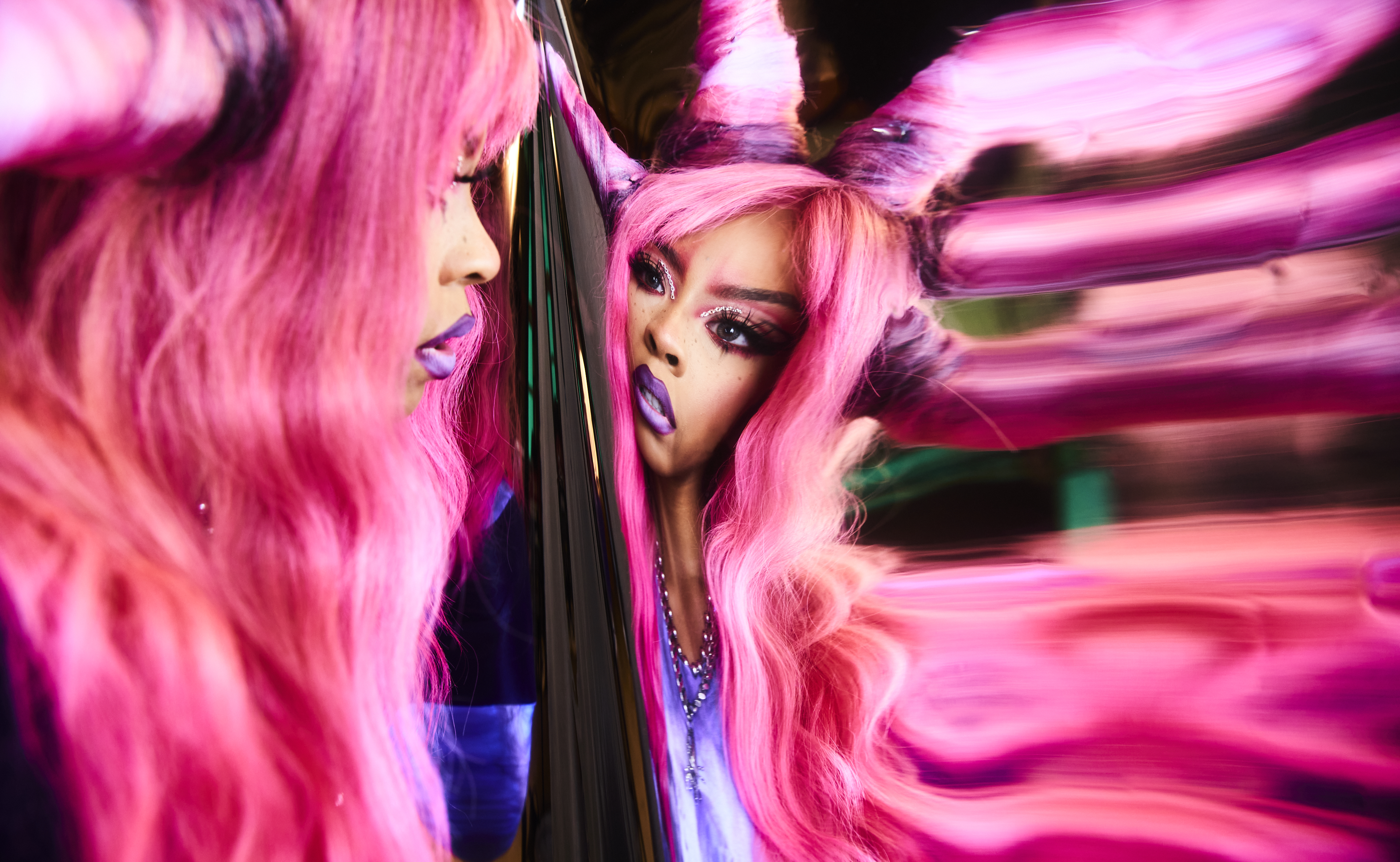
Rico’s mad scientific musical method has the benefit of both singular existence and universal appeal — there’s something for everyone on her albums, but there’s nothing else like them on the market. She’s intrigued by experimentation, following whichever whim takes her fancy and capable of shifting lanes just as the listener thinks they have her figured out. As she told me over the phone a month before our in-person meeting, “I feel like I don’t fit in those things because I feel like a lot of the reasons why people give me all these, I guess you can call them homes, [is] like trying to find a home for what I do.”
“Obviously, we don’t know what [my genre] is now because it’s only been three years of rapping,” she continues. “It’s because they’re just unfamiliar with it, but 10 years down the line, it’ll be a trail of what this is. It could be punk, it could be a bunch of things. But I say I don’t resonate with those things, because rather than putting me in those things, I would rather people just watch and see what happens. Because I change a lot, so you never know what it could be. Just appreciate it for what it is.”
Which brings us to Nightmare Vacation, Rico’s official debut album. Take all the ingredients of her previous projects — the dreamy, syrupy trap, the spiked collar thrash, the playful party raps — and twist the knob to eleven. For fans of more upbeat, cruising-altitude hip-hop, there are tracks like “Don’t Like Me” with Gucci Mane and Don Toliver, “Back & Forth” with Aminé (a reunion of their 2018 collaboration “Sugar Parents” from Aminé’s OnePointFive mixtape), “Loser” with Trippie Redd, and solo outings “No Debate” and “Own It.” When you just need to “Let It Out,” she goes full, balls-to-the-wall hardcore on “Girls Scouts,” “OHFR,” and the remix to her fan-favorite Nasty single “Smack A Bitch” with fellow rule breakers PPCocaine, Rubi Rose, and Sukihana. And she more than holds her own in the raunchy femme-rap department with “Pussy Poppin,” sampling the same DJ Jimi track that gave City Girls and Cardi B their own “Twerk” anthem.
Rico tells me that while this eclecticism is intentional, it’s also a simple function of who she is — she has to be herself at all times. She’s gone through a punk phase, yes, but she also got really into the anime Chobits at one point, adopting the show’s cutesy aesthetic as her own. Even the reference throws most interviewers, highlighting how deeply she delves into her interests — which are broad-ranging and varied. That means stuffing each of her adolescent phases into one constantly-evolving package that can confuse people who insist on seeing her just one way because she doesn’t have the capacity to hide any aspect of herself for other peoples’ benefit. “Everybody can put up whatever persona that they want, but everybody’s human,” she reasons. “I just feel like everybody gives a fuck. I’m tired of everybody acting like they don’t give a fuck. If they didn’t give a fuck, then everybody wouldn’t be saying that they don’t give a fuck.”
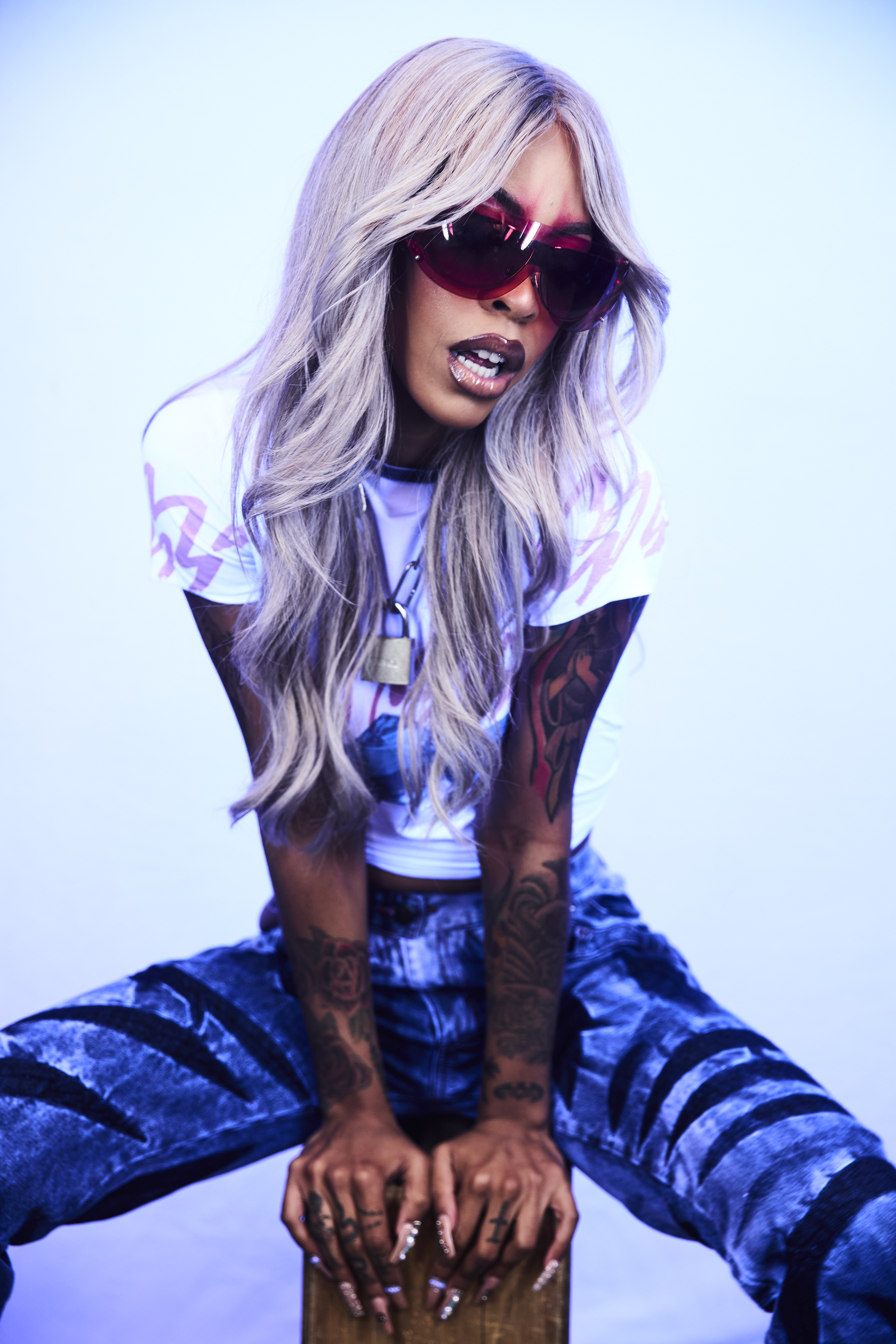
Rico Nasty has always been like this, refusing to fit in any bubble or box, standing out, but willing to throw herself wholeheartedly into being herself. In fact, it goes back to long before she was Rico Nasty. Born Maria Kelly in Largo, Maryland, Rico credits her Puerto Rican mother for always encouraging her to listen to her own drummer, despite what her peers may naysay. “I went to boarding school and my mom is dropping me off on Sunday to go to school,” she reminisces. “I had on a neon orange skirt with rainbow-striped socks. And they were knee-high socks and all the other kids had all regular clothes. And my mom looked at me and she asked, ‘Are you going to be okay?’ I said, literally, ‘I don’t care.’ And she was just like, ‘You don’t care that they’re going to look at you and probably say that not a cute outfit?’ I was like, ‘They don’t have to wear it.’” If she sees those same boo-birds from back in the day now, she says, “They’re never going to say anything, they’re just going to look at you.”
Citing anime, the scene culture, skate culture, and more as the influences on her one-of-a-kind style, she recounts the origins of her fearlessness as she adopted looks inspired by her favorite characters from anime. “Everything was cute,” she gushes. “I just wanted everything to be cute. It was like an obsession with kawaii. It was weird as shit. I think it was good though because before I hit that, I was seen and I had a fringe bang. It was really bad.” She also remembers going through a phase of having to fend off gatekeepers and rock snobs who challenged her nu-metal cred after wearing a Korn tour T-shirt throughout middle school.
Being a scene teen made her fond of rebellious figures like Lil Uzi Vert, from whom she also learned to tune out the peanut gallery. “They just always saying something about somebody that’s different, but they still listen to them,” she observes. “It’s just like a new flavor. If I go to a restaurant and they tell me it’s a new dish I never ate before, I’m going to ask questions. ‘What is in this? What’s in this? Where did you make it? How did you make it?’ I’ve never had it before, so I’m going to ask questions.”
“That’s how the audience is,” she continues. “They always ask questions. I feel like they’re never going to be satisfied because there’s no such thing as a perfect human being. So, there’s always going to be something they don’t like about you. If it’s not your music, it’s the way you dress. If it’s the way you dress, they don’t like the way you talk. If they don’t like the way you talk, then they don’t like the way you think. If they don’t like the way you think, they don’t like the way that you type on Twitter or the pictures you post. It’s always going to be something. So, if this is the lane you want to choose to be in, then you really need to have thick skin.”
She’s cultivated thick skin herself, although she’s now passed off social media duties to Malik after the exposure to so much nonstop needling pierced even her armor. But back then, music provided an outlet for her frustrations with her peers’ perception of her, resulting in Rico producing her first mixtape in tenth grade. Rico formally made her entry into the hip-hop world in 2016 with the mixtapes The Rico Story and Sugar Trap, which spawned the viral hit “iCarly” — yes, named for the Nickelodeon sitcom starring Miranda Cosgrove. The attention garnered by the SEO-gaming hit led to her collaborating with Lil Yachty on a pair of songs at the height of his own ascension, “Hey Arnold” and “Mamacita.” The latter appeared on the soundtrack of the eighth Fast And Furious installment, Fate Of The Furious, and further extended Rico’s reach.
Then, in 2017, she had her second major breakthrough with the mixtape Tales Of Tacobella, which she calls her favorite project. “I like Tales Of Tacobella, but only because, like, it was my first time going out to Cali,” she admits. “I’m in California, Hollywood dreaming. And the first song is ‘Once Upon A Time.’ Sometimes, living in my house and just living my life, whenever I hit that song, if I’m drunk, I will cry. Because this is all I really ever wanted to do — get rich. I kind of manifested everything in that song. I remember just thinking, ‘What do you want out of this shit?’ And I was like, ‘Well, once upon a time there lived a bad bitch, and all she ever wanted to do was get rich.’ I had never felt so optimistic in my life. Let me just say that. I felt like I could be on top of the world.”
Sugar Trap 2 followed, and it was a learning experience for Rico and her collaborators on the way to a major-label deal with Atlantic Records. She calls it the last, but not the least of her favorite projects, only because it was her first encounter with the tension between commerce and creativity. Up until that point, she’d done what came naturally, whether screaming her throat raw on the tracks that earned her the “punk” branding from outlets or singing along with the cotton-candy, whimsical tracks that formed the foundation of her “sugar trap” signature. This time, though, she received the first real challenge to her self-confident approach.
“There are so many songs on there that I’m like, ‘Why didn’t I punch in?’” she remembers ruefully. “‘Why didn’t I just fucking go back in and fix ‘Same Thing?’ And that song is probably the worst song I’ve ever recorded in my fucking life because I recorded it on a different beat. And then the label liked it. I wasn’t signed, but they were like looking at my shit and just had a close eye on what I was doing. So, they were like, ‘We really like this song, this song is fire!’ So I tried to buy the beat, couldn’t buy the beat, and just wound up going back and re-cutting the song on that beat. And it sounded fucking terrible. I was just like, ‘No, the label liked it, I’m going to keep it on here.’”
Her popularity exploded in 2018 with the track “Smack A Bitch,” rumored to be a shot at Dallas rapper Asian Doll, with whom she’d previously collaborated but later fell out. “Smack A Bitch” may be the quintessential track to introduce a newcomer to Rico Nasty; it’s jagged and raw, but relatable, swaggering between aggrieved and arrogant as Rico gives thanks that her myriad blessings allow her to dismiss her foe. It’s less about the rage than the relief, distilling the pufferfish essence of Rico’s rap persona into a 2-minute-and-20-second scream therapy session set to a punishingly serrated electric guitar riff that blasts through any anxiety-inducing thoughts by removing all thought entirely.
That energy carried over onto Rico’s debut mixtape with Atlantic, which coalesced the various styles she’d cultivated on her previous records into a confident amalgam of old-school influences, assertive, futuristic instincts, and punk-inspired irreverence. She doubled down on those impulses with its follow up, the aptly-titled Anger Management, produced entirely by her ace collaborative partner, Kenny Beats. She credits her sibling-esque relationship with Kenny for pushing her to new creative heights describing their dynamic in contrast to her easygoing correspondence with 100 Gecs producer Dylan Brady. “Because Dylan and I are both so weird and shit, we don’t criticize each other,” she elaborates. “We just work out like that and try to fix it. But I can be in a booth with Kenny and he’s like, ‘Nah, bruh, you can do this better.’ So we could go back and forth, low key arguing. Both of them are totally different, but I probably wouldn’t be who I am today if I didn’t have such amazing people in the studio letting me do what I want to do and then also giving me constructive criticism.”
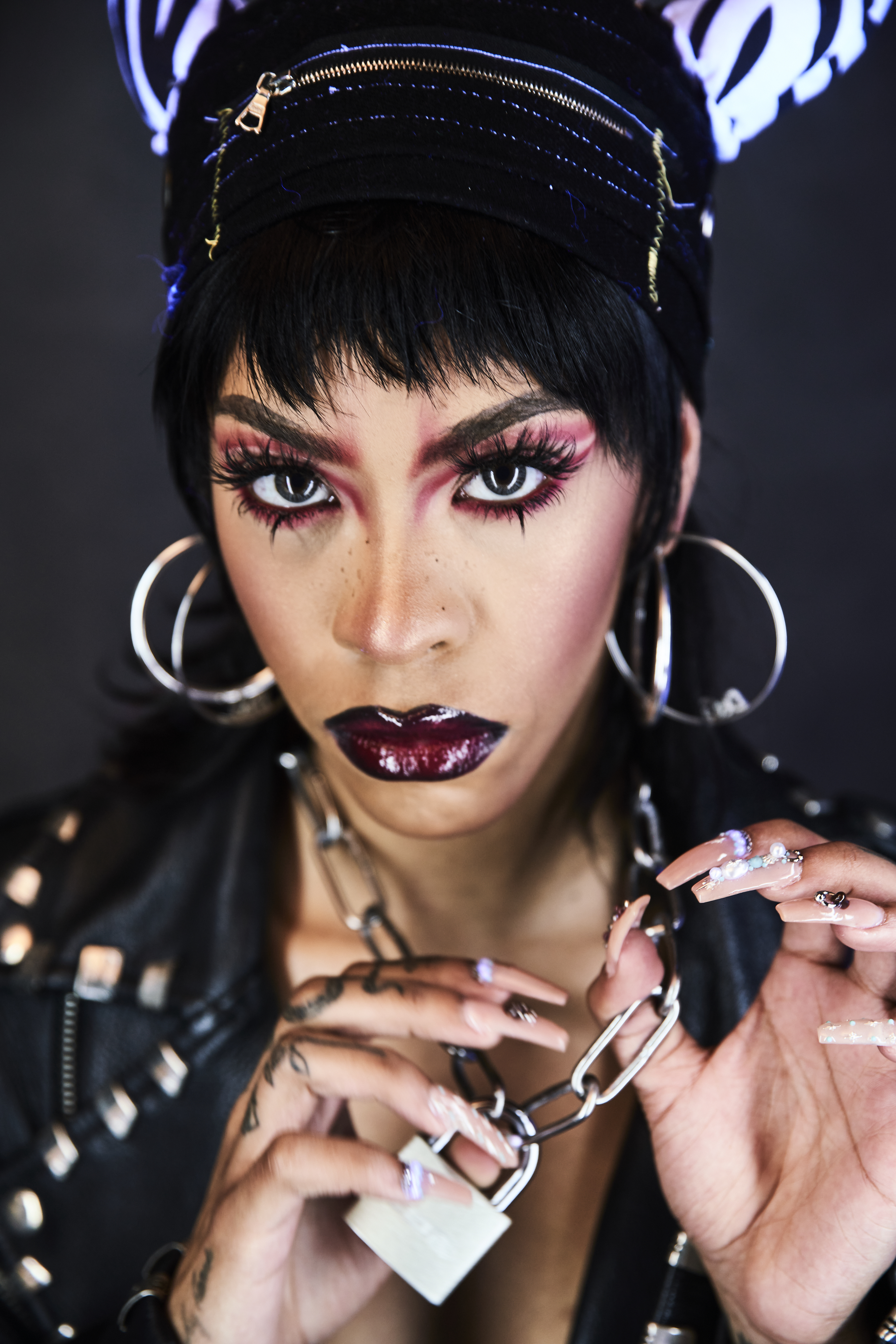
Rico’s last nightmare was about Nicki Minaj.
However, it wasn’t in the way that Nicki Minaj can sometimes be a new rapper’s worst nightmare, when her Barbz pounce on unsuspecting offenders, leading to hours of noxious comments on social media and fan-fueled beef with even her most magnanimous collaborators. Rico’s nightmare is of a more conventional, subliminal variety. “I was at the BET Awards and Nicki Minaj was up there talking, and I got up to do something and Nicki Minaj was like, ‘Don’t you stand while I’m speaking.’ It was the way she said it that woke me up out of my sleep. I swear to God, that was the craziest dream because I remember I woke up like, ‘What? Was that Nicki Minaj? Who was it?’ She had a British accent. She was like the lady from the Hunger Games.”
I wonder whether it has to do with letting down her fellow women in rap, whom she’s been intentional about working with on her past projects. On Nightmare Vacation, she makes it a point to extend her platform to the benefit of a trio of relative newcomers, who join her on the remix of “Smack A Bitch”: TikTok star PPCocaine, Kentuckian model turned gruff-voiced rap femme fatale Rubi Rose and former reality TV fixture Sukihana. Rico’s reasoning is simple; she puts her money where her mouth is. “When women talk about my music, they talk about it giving them strength, right?” she confirms. “They talk about it making them feel like a bad bitch. So I feel like obviously not every woman can relate to me because like you said, I’m different. But women can relate to Rubi Rose, women can relate to Suki, women can relate to PPCocaine.”
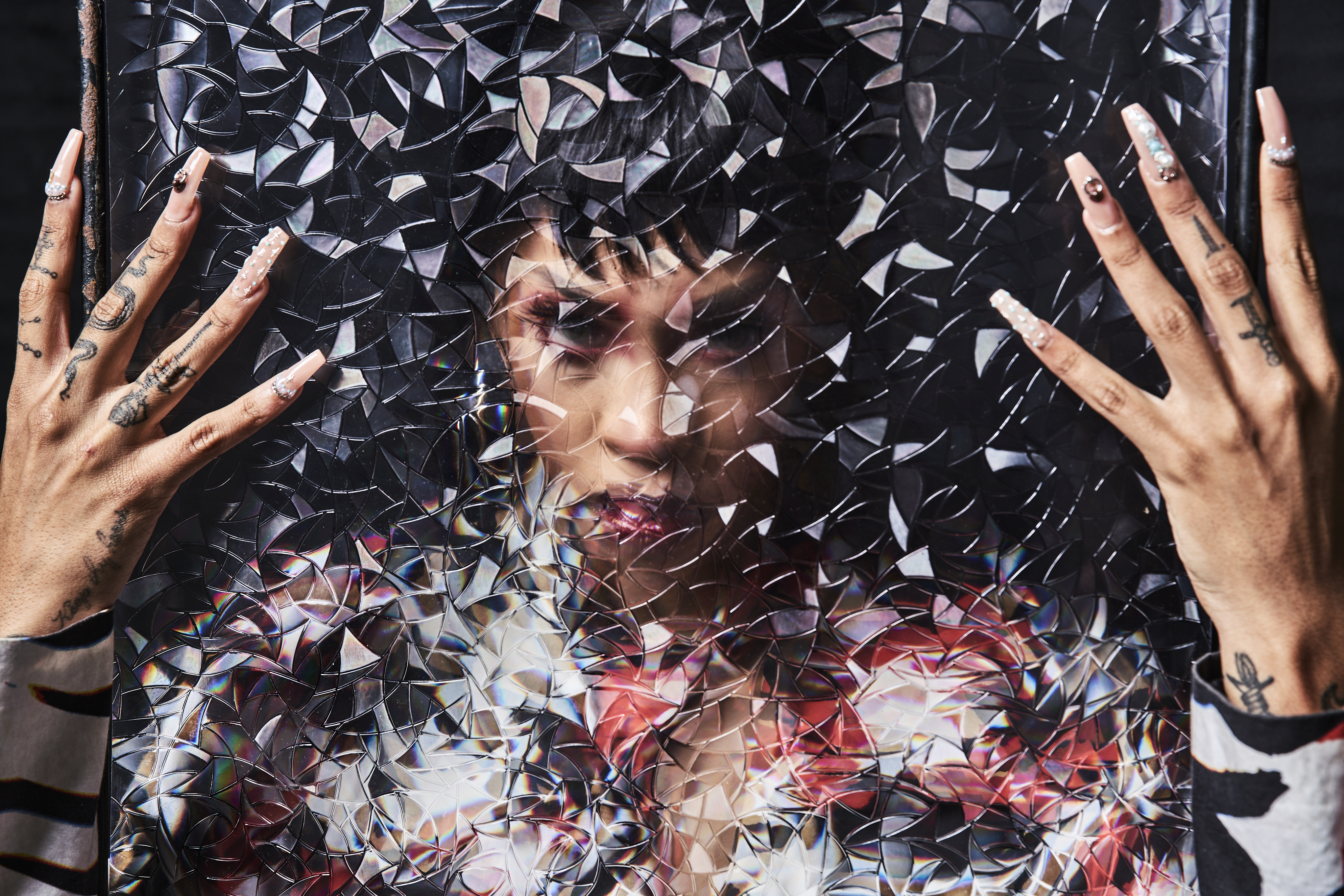
“Every woman is different, and because of there being times where most of us are only used for our face or like an accessory or something, I say, ‘Fuck that.’ And I don’t care how many followers you have. I don’t care about your longevity. I care about the emotion that you bring to a song. I care about how when people put your music on, it gives them that same shit that my music gives them. I like that shit because it’s not hard rock and roll. It’s a different spectrum. It’s a different perspective on women. All of the girls are different in their own way. A real G is not ever going to try to insert themselves and do some shit that they can’t do. They would rather just let somebody — if they do it better, they going to do it better. And that’s how I feel about these girls. Instead of me getting on a song and trying to talk all nasty and stuff, that’s them.”
Of course, a therapist would tell you that the key to “interpreting” dreams isn’t in finding out what they mean but processing how they make you feel. For Rico, the main feeling she left her REM sleep with was one of anxiety. “I hate getting yelled at,” she explains. When I point out the irony in contrasting that fact with her rap persona, she comes up with what might be the perfect distillation of why she approached her music the way she does. “If somebody was to yell at me, I would yell so loud, they probably would never want to yell at me again.”
Which seems like the perfect segue to comment on how odd it is that our first time finally meeting in person is in New York, across the country from my usual stomping grounds and from where she actually has scheduled her photoshoot at the Uproxx offices. New York is a city whose citizens are known for their confrontational nature, which Rico says she’s well-suited to. “PG County is a rude place,” she chuckles. “It’s very rude. People don’t give a fuck how you feel. They don’t care. They have a point, too. Why would we? Who cares about us.” I ask what she likes most about New York: “The people,” she replies. “My fans from New York are the best. Oh, god. Please don’t hate me guys. My fans from the DMV, I love them. My fans from New York, they’ll fight, though. They fight and they dress nice. If that don’t say Rico Nasty, then I don’t know what in the fuck else would.”
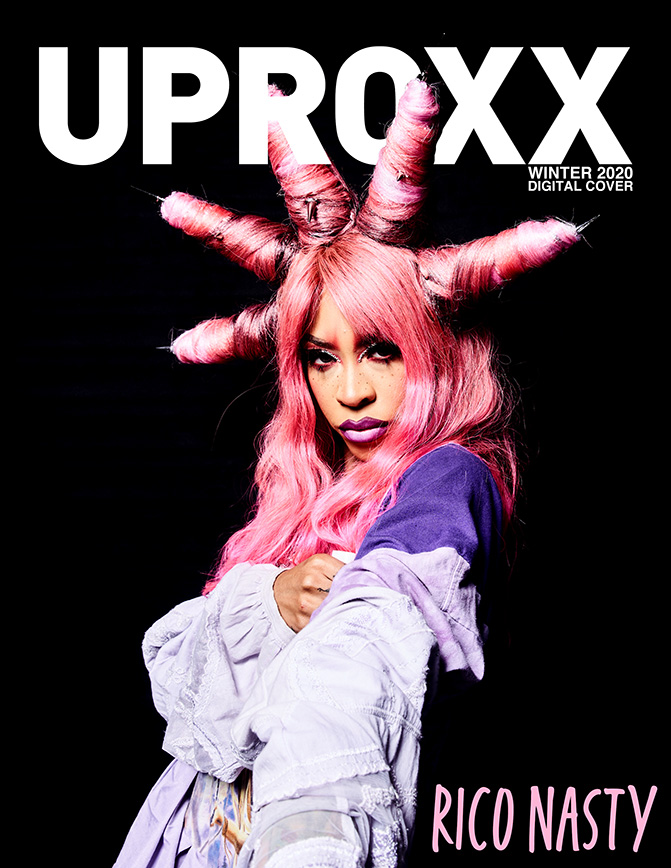
Rico Nasty is a Warner Music artist. All Photography by Paul L. Carter.







